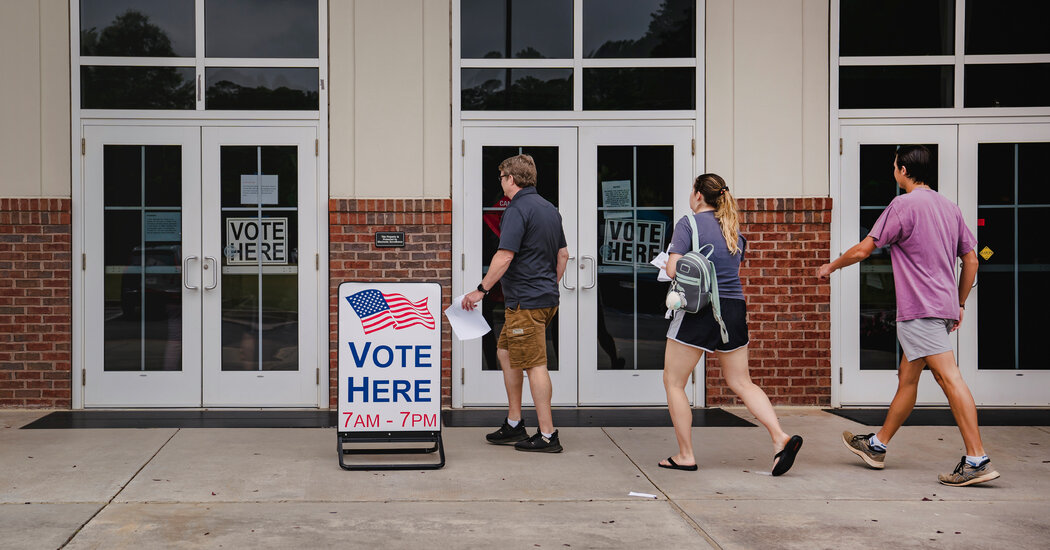Ahead of the 2020 election, Connecticut faced a slew of untruths about votes floating around online. One, widely viewed on Facebook, erroneously said absentee ballots had been sent to dead people. On Twitter, users spread a false post that a tractor-trailer carrying ballots had crashed on Interstate 95, sending thousands of voter notes up and down the highway.
Worried about a similar deluge of baseless rumors and lies surrounding this year’s midterm elections, the state plans to spend nearly $2 million on marketing to share factual information about voting, as well as create its first-ever position for an expert in voting. fighting misinformation. With a salary of $150,000, the individual is expected to comb fringe sites such as 4chan, far-right social networks such as Gettr and Rumble, and mainstream social media sites to stamp out early misinformation about votes before they go viral, then urge the companies to remove them. or flag messages that contain false information.
“We need to have situational awareness by investigating all incoming threats to election integrity,” said Scott Bates, deputy secretary of state for Connecticut. “Disinformation can erode people’s confidence in elections, and we view that as a critical threat to the democratic process.”
Connecticut joins a handful of states preparing to fight a wave of rumors and lies about this year’s election.
Oregon, Idaho and Arizona have information and advertising campaigns on the Internet, TV, radio and billboards designed to disseminate accurate information about election times, eligibility and absences. Colorado has hired three cybersecurity experts to check sites for misinformation. The California Secretary of State’s Office is looking for misinformation and is working with the Department of Homeland Security and academics to look for patterns of misinformation on the Internet.
The moves of these states, most of which are under democratic control, come as voters’ confidence in electoral integrity has plummeted. In a January ABC/Ipsos poll, just 20 percent of respondents said they were “very confident” in the integrity of the electoral system and 39 percent said they were “somewhat confident.” Countless Republican candidates have embraced former President Donald J. Trump’s lies about the 2020 election and campaigned — often successfully — on the false claim that it was stolen from him.
Some conservatives and civil rights groups will almost certainly complain that efforts to curb disinformation can curtail free speech. Republican-led Florida has passed legislation limiting the kind of social media moderation sites like Facebook, YouTube and Twitter can do, with supporters saying the sites restrict conservative votes. At the federal level, the Department of Homeland Security recently halted the work of an advisory board on disinformation after a barrage of criticism from conservative lawmakers and free speech advocates that the group could suppress speech.
“Government and local governments are well placed to reduce the harm caused by misinformation by providing timely, accurate and reliable information,” said Rachel Goodman, an attorney at Protect Democracy, a nonpartisan advocacy group. “But to maintain that trust, they need to make it clear that they are not engaging in any form of censorship or surveillance that would raise constitutional concerns.”
Connecticut and Colorado officials said the misinformation problem has only worsened since 2020, and without a more concerted effort to counter it, even more voters could lose faith in the integrity of elections. They also said they fear for the safety of some election workers.
“We’re seeing a threatening atmosphere like this country has never seen before,” said Colorado Democratic Secretary of State Jena Griswold. Ms. Griswold, who is up for re-election this fall, has received threats to uphold the 2020 election results and refute Mr Trump’s false claims about fraudulent voting in the state.
Other secretaries of state, who head the office usually charged with overseeing elections, have faced similar setbacks. In Georgia, Brad Raffensperger, a Republican who has confirmed President Biden’s victory in the state, has faced fierce criticism accompanied by false claims about the 2020 election.
During his primary this year, Mr. Raffensperger misinformation that there were 66,000 underage voters, 2,400 unregistered voters and more than 10,350 dead who voted in the presidential election. None of the claims are true. He won his primary last week.
Colorado is rearranging a disinformation team that the state has set up for the 2020 elections. The team is made up of three election security experts who check the internet for misinformation and then report it to federal law enforcement.
Mrs. Griswold will oversee the team called the Rapid Response Election Security Cyber Unit. It only looks for election-related misinformation about things like absentee voting, polling stations and eligibility, she said.
“Facts still exist and lies are being used to undermine our fundamental freedoms,” Ms Griswold said.
Connecticut officials said the state’s goal was to patrol the Internet for untruths in elections. On May 7, the Connecticut legislature approved $2 million for Internet, TV, postal and radio education campaigns about the election process, and to hire an election information security officer.
Officials said they would give preference to candidates who speak fluent English and Spanish to tackle the spread of misinformation in both languages. The officer is said to track down misinformation viral posts on Facebook, Instagram, Twitter and YouTube, and look for new stories and memes, especially on fringe social media platforms and the dark web.
“We know we can’t boil the ocean, but we need to figure out where the threat is coming from and before it metastasizes,” said Mr. bates.
Neil Vigdor contributed reporting.

